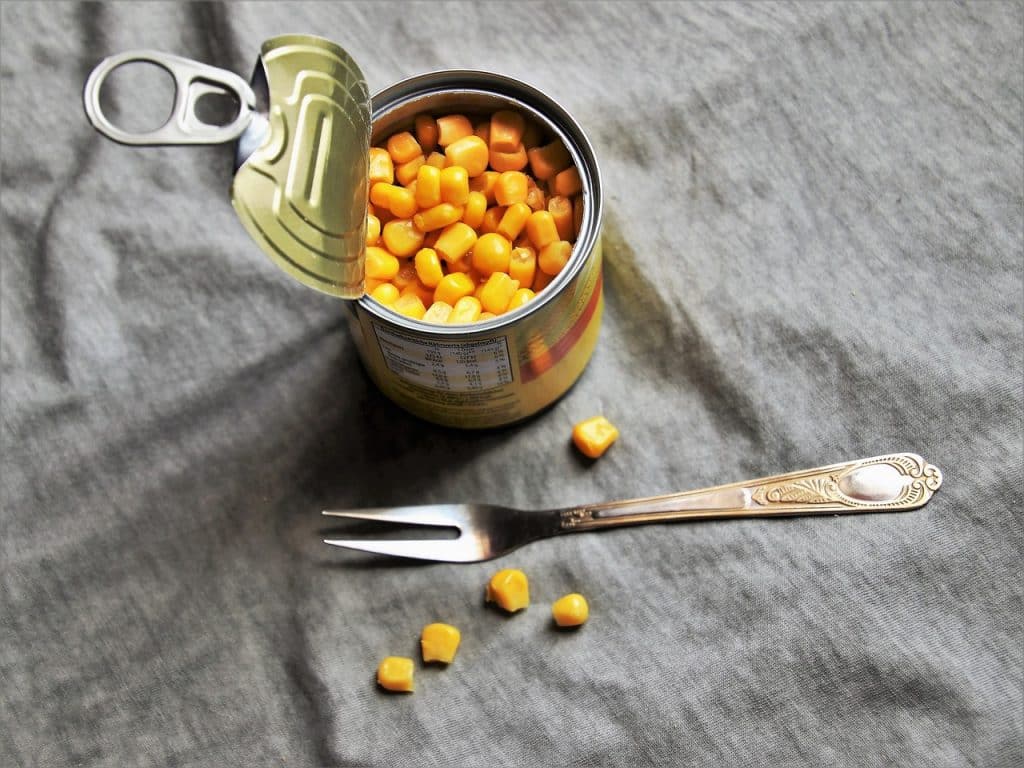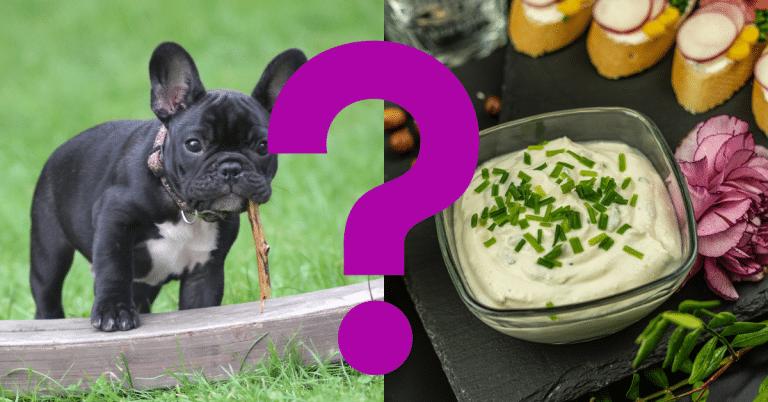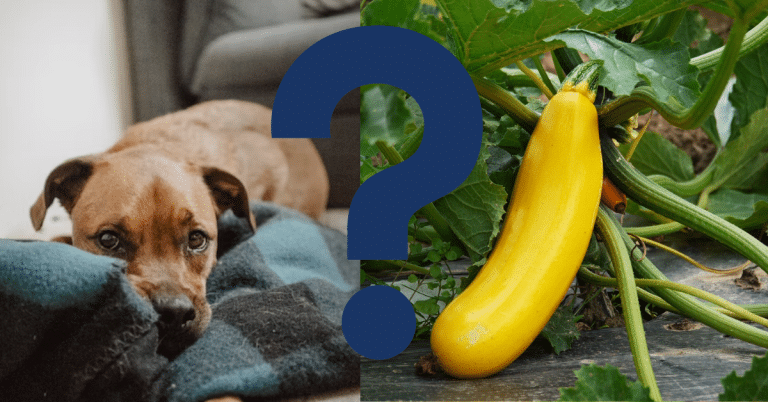Can Dogs Eat Canned Corn? A Vet’s Summary

Canned corn contains salt and seasonings but can dogs eat canned corn?
Although feeding canned corn to dogs in little amounts is typically harmless, it shouldn’t be a staple of their diet. Although maize doesn’t directly harm dogs, it doesn’t provide them with many nutrients either. In excess, ingredients such added salt or other flavors in canned corn might be detrimental to dogs.
Let’s dive in:
Benefits Of Canned Corn For Dogs
Due to its nutritious value, feeding canned corn to dogs sparingly and without additional spices might have certain advantages. It’s crucial to keep in mind that maize has relatively few advantages compared to other meals, therefore it shouldn’t be a mainstay in a dog’s diet. Cans of maize may offer the following advantages to dogs:
- Dietary fiber, which is found in maize, can aid in digestion and encourage regular bowel movements in dogs. Consuming enough fiber might help keep the digestive system healthy.
- Dogs get their energy from maize, which is a source of carbs. For energetic dogs, it can be a part of their diet to help them maintain their energy levels.
- Vitamins And Minerals: A variety of vitamins and minerals, such as vitamin B6, folate, and manganese, are found in maize and are crucial for good health. These vitamins and minerals may benefit a dog’s health.
- Despite not having a significant protein content, maize does include some of the amino acids required for the upkeep and growth of muscular tissue.
- Low In Fat: Corn is a good choice for dogs with dietary restrictions or those that require a low-fat diet because it has a relatively low-fat content.
Despite these possible advantages, it’s important to keep in mind that dogs need a diet that predominantly consists of high-quality animal proteins and fats. Corn shouldn’t be used to substitute necessary nutrients in a balanced canine diet; rather, it should only be provided as an occasional treat or supplemental meal. Additionally, make sure that any canned corn you buy is simple and free of flavours, salt, or sugar, since these can be hazardous to dogs if consumed in excess. Consult your veterinarian before introducing any new food to your dog’s diet to be sure it meets their unique dietary requirements and current state of health.

How To Safely Give Canned Corn To Dogs
If you want to securely feed canned corn to your dog, go by these instructions to make sure it’s a treat your pet may enjoy without being hurt:
Check The Ingredients
Before giving your dog canned corn, be sure it just includes corn and water by carefully reading the label. Do not feed your dog any canned corn that has been seasoned with salt, sugar, spices, or other substances.
Portion Control
Don’t overfeed your dog with canned corn. It is adequate to consume a tiny quantity as an occasional pleasure. Never forget that their usual, balanced dog food shouldn’t be replaced with maize.
Corn Preparation
Run running water over the canned corn to rinse away any extra salt and other pathogens. You can also choose plain, unseasoned maize kernels that have been cooked.
Cut Into Bite-Sized Pieces
If you are giving your dog canned corn, think about chopping it into smaller, more manageable pieces. This can make your dog’s digestion simpler and assist in preventing choking.
Check For Digestive Problems Or Allergies
Some dogs may be sensitive to or allergic to maize. Introduce it gradually into their diet while keeping an eye out for any unfavorable effects, such as nausea, vomiting, or gastrointestinal trouble caused by allergies.
Balance With Other Foods
While canned corn can be given as a treat on occasion, it shouldn’t take the place of a diet consisting of dog food that is properly balanced. Make sure that the main source of nourishment for your dog is high-quality commercial dog food that satisfies their unique nutritional needs.
Visit Your Veterinarian
If your dog has any dietary limitations, especially if you plan to introduce any new foods to his diet, visit your veterinarian before doing so. They may offer advice on serving sizes and whether canned corn is acceptable for your dog’s specific needs.
When giving your dog any human food, even canned corn, always put their overall health and welfare first. A dog’s main diet should consist of nutritionally balanced dog food made to fit their individual needs, while it can be given as a treat on occasion.
Will Canned Corn Make A Dog Sick?
Although canned maize isn’t intrinsically poisonous to dogs, it may make a dog ill if fed to them in large doses or if it has specific additives. The following are possible causes of a dog’s illness from canned corn:
- Additives: Some canned corn products might include extra salt, sugar, or spices, which in big doses could be dangerous to dogs. For instance, consuming too much salt can cause dogs to develop salt toxicity (sodium ion poisoning), which can cause symptoms including vomiting, diarrhoea, increased thirst, and even more serious health problems.
- Digestive Distress: Dogs that ingest a lot of maize or who have sensitive systems may develop digestive distress. Symptoms such as diarrhea, gas, or stomach pain may result from this.
- Although it’s uncommon, some dogs may react negatively to maize due to allergies or sensitivities. Your dog may exhibit signs like rashes, digestive troubles, respiratory problems, itching, or digestive problems if they have a maize allergy.
To lessen the chance that cans of maize can give your dog an illness:
- Always choose simple canned corn varieties over those with spices or other additions. Make sure it just includes maize and water by carefully reading the label.
- Limit The Amount: Canned corn should only be served in tiny amounts on rare occasions as a treat. It shouldn’t be used as a substitute for your dog’s usual, balanced dog food.
- If you decide to feed canned corn to your dog, introduce it gradually into their diet and keep an eye out for any negative responses. Stop giving children maize if you observe any symptoms of stomach distress or allergies.
- Consult Your Veterinarian: Speak with your veterinarian if you have questions about giving canned corn to your dog or if they have any special dietary requirements or allergies. They may offer advice on the best treats and meals to feed your dog based on his or her specific nutritional needs.
Though it’s acceptable to give your dog tiny quantities of canned corn as a treat now and again, keep in mind that their major nourishment should come from a high-quality commercial dog food that satisfies their unique dietary requirements.

A Vet’s Summary
In general, veterinarians advise against feeding canned corn to dogs. Even though canned corn is safe for dogs, there are a few factors that make it unsuitable as a regular treat or part of a dog’s diet:
- Nutritional Value: Most of the canned corn is made up of carbs, and it is deficient in the critical vitamins and minerals that dogs require in their diet, such as high-quality protein and heart-healthy fats. Dogs must consume a diet high in animal-based proteins and lipids to maintain good health.
- Additives: A lot of canned corn products have salt or other spices that, when consumed in excess, can be detrimental to dogs. Particularly foods with a lot of salt might cause salt intoxication and other health problems.
- Digestive Issues: Some dogs may have trouble digesting maize, which can result in gastrointestinal issues like diarrhea, gas, and stomach pain.
- Some dogs may be allergic to or sensitive to maize, which can result in adverse symptoms including itching, rashes, or stomach issues.
- Weight Issues: Corn contains a fair amount of carbs, and if consumed in excess it can lead to obesity and weight gain in dogs.
For these reasons, veterinarians normally advise against feeding canned maize to dogs unless it is a rare treat or in moderation. It shouldn’t constitute a mainstay of their diet. It’s frequently preferable to select dog-specific snacks or give your dog simple, cooked veggies as rewards, such carrots or green beans, since they are typically more well-tolerated by dogs, if you wish to give them healthful treats.
Probiotics are edible for dogs and may be good for their intestinal health. Probiotics are living microorganisms, usually yeast or bacteria, that, when taken in sufficient quantities, can have positive effects on one’s health. It’s imperative to speak with your veterinarian before feeding your dog probiotics.
Before introducing new items to your dog’s diet, always check with your veterinarian, especially if your dog has certain dietary limitations, allergies, or health difficulties. The ideal food for your dog’s needs might be recommended by your veterinarian.
Videos To Watch
If you are wondering whether dogs can eat canned corn, watch this:
If you are wondering whether corns are good fo0r dogs, watch this:






